Saturday, 13th–The Eleventh Iowa moved out towards the rear about four miles, to relieve the Ninety-third Illinois on picket. The land around here is very rough and heavily timbered. There is an occasional small farm. The people around here are all rank secessionists.
American Civil War Chronicles
0
June 13, 2023
June 13th. A fire was seen early this morning down by the lower fleet, also at the same time, heavy bombardment of Port Hudson going on, by our army and naval forces. Between the hours of four and eight A. M., heavy firing of musketry, artillery, &c., at Port Hudson; at nine A. M. inspected crew at quarters; at five P. M. the Albatross came down the river and anchored ahead of us. Mortars of lower fleet still firing, and the rebels replying with their lower batteries; at ten o’clock P. M., our mortar schooners still at work in their attempt to reduce Port Hudson. Clear and pleasant weather the whole of the twenty-four hours.
A Rebel War Clerk’s Diary
June 13, 2023
JUNE 13th.—Col. Baylor, of Arizona, has been heard from again. He confesses that he issued the order to slaughter the Apaches in cold blood, and says it is the only mode of dealing with such savages. The President indorses on it that it is “a confession of an infamous crime.”
Yesterday the enemy appeared on the Peninsula, in what numbers we know not yet; but just when Gen. Wise was about to attack, with every prospect of success, an order was received from Gen. Arnold Elzey to fall back toward the city, pickets and all.
A letter from Gen. Holmes, containing an account from one of his scouts, shows that the enemy’s militia in Arkansas and Missouri are putting to death all the men, young or old, having favored the Confederate cause, who fall into their hands. These acts are perpetrated by order of Gen. Prentiss. The President suggests that they be published, both at home and abroad.
Mr. L. Heyliger, our agent at Nassau, sends an account of the firing into and disabling the British steamer Margaret and Jessee by the United States steamer Rhode Island, within a half mile of shore. Several British subjects were wounded. This may make trouble.
Mr. J. S. Lemmon applied by letter to-day for permission to leave a Confederate port for Europe. Major-Gen. Arnold Elzey indorsed on it: “This young man, being a native of Maryland, is not liable to military service in the Confederate States.” Well, Arnold Elzey is also a native of Maryland.
0
June 13, 2023
From the diary of Osborn H. Oldroyd
JUNE 13TH.–The siege continues with increased fury, and the boom of cannon announces the sacrifice of more lives. Instead of any cessation the artillery plays upon the city almost every moment throughout the day. The variety of the projectiles becomes greater. The shrapnel, I think, must be most formidable to the enemy. It is a shell filled with eighty small balls, which, when the shell is exploded, scatter in every direction. It makes a fearful buzzing sound as it flies–a warning to seek cover, if such can be found. Besides this there are the parrot, cannister, grape and solid shot. The cannister and grape are also cases wherein are enclosed a number of small balls. But the least fragment from an exploded shell is sufficient to wound or kill.
I have a great curiosity to see the court house at Vicksburg. It stands on a hill, and seems to be the target for many cannon. There is a Confederate flag waving from it defiantly. A proud day it will be when we haul it down and raise in its stead the stars and stripes, never to be displaced again. The buildings in the city must, by this time, be pretty well riddled with shot and shell. The women, it seems, did not all leave the city before the bombardment began, and I suppose they have determined to brave it out. Their sacrifices and privations are worthy of a better cause, and were they but on our side how we would worship them. It is rumored in camp that Grant is getting reinforcements from the eastern army. I have a great desire to see them, for while we have always thought them to be no less brave, they are said to be better clothed and equipped than the western boys. In fact, from the eastern army, during the last year, the standing report among western boys has been merely such catch phrases as “Bull Run,” “Burnside Crossing the Rappahannock,” “All Quiet on the Potomac.” Perhaps such reports or their substance will continue to fill the headlines of news from those departments until Lincoln commissions Grant commander of the whole army. Should that occur, one grand move forward will be made and the Southern confederacy will be crushed forever.
We are doing all we can to expedite the glorious victory awaiting us here, yet there are grumblers in the North who are complaining of our slow progress, and treasonable articles are published in some papers that come to us from the North, intended to discourage the soldiers. Why don’t Grant move? If we had all those grumblers in Vicksburg, I fancy they would soon find something from Grant was moving quite briskly. But Grant does not idle away his time himself, nor let his men be idle. If the people of the North will but back us up with their aid and confidence, we shall feel well repaid for all the sufferings we endure here, staring death in the face, and standing like a solid wall between their homes and danger.
Let not a murmur meet the ear,
Nor discontent have sway;
Let not a sullen brow appear
Through all the camp to-day.
0
June 13, 2023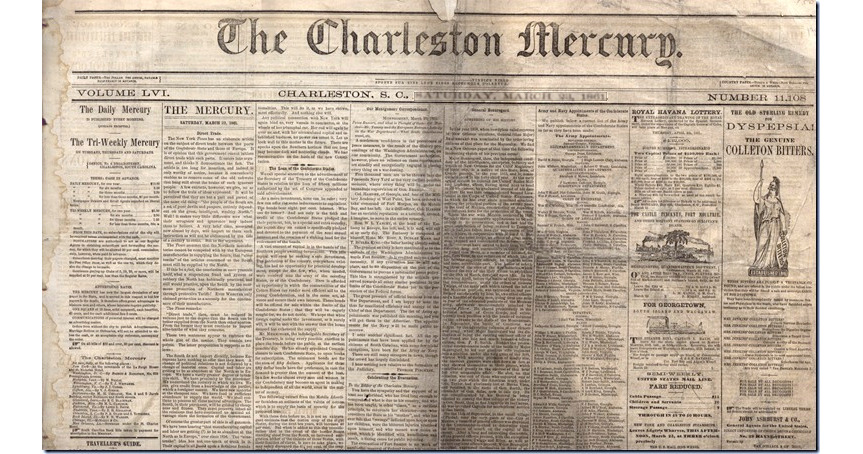
June 13, 1863, The Charleston Mercury
(CORRESPONDENCE OF THE MERCURY.
RICHMOND, Tuesday, June 9.
Perhaps it is all the better for the public sanity that no more telegrams come from Jackson. We are in the dark, too, in regard to LEE’S army. It is thought that EWELL, LONGSTREET and STUART have crossed the Rappahannock, probably in Culpeper, leaving A. P. HILL at Fredericksburg. On Friday evening, when the enemy crossed at Deep Run, we had only a brigade in that vicinity; but by one o’clock the first day 25,000 men and General Lee in person were in readiness to meet Fighting Joe. That the forward movement has not been frustrated by this demonstration of the enemy, may be inferred from the fact that a division left a point below Fredericksburg yesterday morning and took up its line of march in the direction of Gordonsville. A battery of long range guns and some infantry left here later in the day, but their destination was unknown.
Of course, there are a thousand speculations as to Lee designs. The publicity given to his movements would indicate either something very deep laid, or a determination to beat the enemy, after fair warning, wherever met. The secret, if there be one, is well kept. Remembering the issue of last year advance, we do not permit ourselves to be sanguine.
Prices have gone up and down. Gold from $5 to $7.50; wool hats, from $20 to $40 or $50; chickens, from $6 to $2, and butter the same. Meal is very scarce again. The taxes (State, Confederate and city) on whisky amount to $3 50 a gallon, and some dealers are closing up.
We have queer weather of late – cool mornings, warm noons, and every afternoon a cold storm, threatening rain, but ending in wind.
Col. Rhett, of THE MERCURY, is in the city.
HERMES.
0
June 13, 2023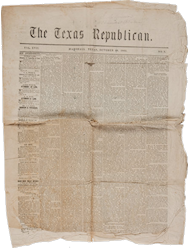
June 13, 1863, (Marshall) Texas Republican
Among many instances of petty tyranny, that of the schools in New Orleans bears the palm. After issuing an order that all theatres, concerts and exhibitions, the tunes of the Star Spangled Banner, Hail Columbia and Yankee Doodle, should be played, the officer in command issued a special order that these tunes should be sung by the children in each school in the city, every day. Numbers of persons took their children from school and taught them at home. The miserable tyrants then arrested all the private teachers, governesses and ladies, and imprisoned them until they swore allegiance, and to teach the children to sing Yankee Doodle.
0
June 13, 2023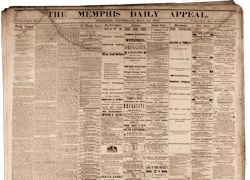
June 13, 1863, Menphis Daily Appeal (Atlanta, Ga)
A young man, a native of South Carolina, twenty-five years of age, dark hair and blue yes who has been in the service in Virginia for two years, but is now exempt from all military duty, wishes to procure a partner for life. All communications strictly confidential. This is a bona fide offer. Address L. A., Care Post Office Box 22, Atlanta, Ga.
0
June 13, 2023
June 13, 1863, The New York Herald
It has been ascertained that the reinforcements reaching General Lee from the Carolinas and elsewhere have swelled his army to double the number he had in the battle of Chancellorsville. His force is divided into three corps, of 30,000 men each. The rebels continue to fire at our pickets. Some artillery practice is tried occasionally by the enemy, but without much effect.
General Mosby’s raid into Maryland, near Poolesville, was not of long duration, nor did it effect much. A telegram from Leesburg says his force was at Carter’s Mills, on Goose creek, Loudon county, at daybreak yesterday, hurrying back to the mountains, and that the Union troops were in pursuit.
Information having been obtained by the War Department that a large rebel force, composed of cavalry, artillery and mounted infantry, has been prepared for the purpose of making a raid into Pennsylvania, the President has created two new departments – one in Eastern Pennsylvania, to be commanded by Major General Couch, and the other in Western Pennsylvania, to be commanded by Major General Brooks. Governor Curtin issued a proclamation yesterday earnestly inviting the attention of the people of Pennsylvania to the general orders issued by these officers on assuming the command of their respective departments, and urging the importance of immediately raising a sufficient force for the defence of the State.
A number of rebel officers, numbering ninety, while being sent to Fort Delaware from [continue reading…]
0
June 13, 2023
June 13, 1863, [Little Rock] Weekly Arkansas Gazette
It is really shameful to notice the disgraceful manner in which some houses are treated, in which soldiers have been camped. We hear of many complaints. Can such a state of affairs last long without a check? This idea of taking possession of a person’s house, in the city, destroying it before the owner’s eyes, is despotic. Well may we exclaim, “Oh, Lord save me from my friends; my enemies I can manage.” With all the reports of the Federals destroying property in the late raid upon Alexandria, we are told that but little damage was done. – Shreveport News, 2d.
0
June 13, 2023
June 13, 1863, Menphis Daily Appeal (Atlanta, Ga)
The Huntsville Advocate says that during the recent Federal raid into Florence, Ala., they burnt the three cotton factories of Martin, Weakley & Co., which worked up 4000 bales per year; the woolen factories of Darby, Benham & Co., and of James Martin & Son–five factories. In Florence, they burnt the Masonic hall, one unoccupied tavern, two blacksmith, one coach and one carpenter’s shops, three unoccupied houses, one small residence, etc. They broke open every store in the place, took what they could carry off, robbed citizens of money, watches, jewelry, horses, etc., took off some negroes, desolated and burned Mrs. James Jackson’s place, etc. They also burned several mills and tan yards in the county. This is a fearful inventory the memory of which should be cherished, for a proper application of the principle of lex talionis.
0
June 13, 2023
June 13, 1863, The Charleston Mercury
(From the Richmond Examiner.)
The war has proved the degeneracy of Virginia horse-flesh. We still have as fine horses in Virginia as ever, or as are to be found in any country under the sun; but they are few. At one time in the history of our Commonwealth, first rate horses only were bred; but the general practice has long ago ceased; and our stock of horses has become mixed almost universally with base blood.
Accordingly, that which should be the strong arm of the Southern service, the cavalry, is the weakest and most contemptible. A band of Yankee buggy drivers and teamsters, mounted on Pennsylvania Conestogas, intermingled with cold blooded Morgans and trotters, have swept leisurely through that part of the Confederacy which should have been alive with fleet, ubiquitous and irresistible cavalry. Chase was made in one instance, and the enemy overtaken and chastised; but he rode away after his beating, and our cavalry were unable to follow; the horses being broken down and broken winded. The celerity of Lee’s Legion, and the partisan corps of Sumter, Marion and Hampton in the Southern campaign of the Revolution, was due, in great part, to the excellence of their thoroughbred steeds, which were very fleet, had great bottom, and possessed withal, in some degree, the gift of Fortunio’s horse, which fed but once a week.
The thoroughbred Arabian horse was cherished in Virginia and the Carolinas, as early as in England herself; and such was the enterprise of our good ancestors in this respect, that the first celebrities of the English studbook were purchased at enormous prices, and [continue reading…]
0
June 13, 2023
June 13, 1863, The New York Herald
The first summer after the rebellion broke out was rather a dismal one for the Northern watering places. The best paying visitors at the hotels there had been Southerner; for they made their money fly freely, and spent more in expensive wines and carriages – those two great sources of profit to landlords – than the more calculating and abstemious Northerners. Suddenly cut off from Southern patronage, and also from a considerable portion of that which they were accustomed to receive from the Northern cities, the proprietors of the large hotels in many instances gave up their establishments, despairing of the revival of their business. Those that did so made a great mistake, as the results of the following season proved. To the old visitors succeeded a crowd of new ones – the nouveaux riches of Wall Street speculations and government contracts. These, big with the consciousness of their moneyed importance, vied with each other in profuseness of expenditure, and amply made up to the watering places for the loss of their Southern visitors.
It might equally be anticipated that between the ruin that has fallen upon most of the large proprietors of the South and the demands made upon its whole male population by the military service, the hotels at the Southern watering places would not be in a condition to profit by the barrier that has been raised between the two sections. That such is not the fact we gather from the following advertisement in one of the Richmond papers: –
YELLOW SULPHUR SPRINGS. – This pleasant watering place will be ready to receive visitors on the first day of June. Terms: $8 per day, $50 per week, children under twelve years of age and servants $5 per day, $30 per week. Visitors will find coaches and hackmen at the Christiansburg depot to convey them four miles to the Springs.
This shows that the rich families of the South are not all ruined, and that no more there than here has the war cast a damper upon social and other enjoyments. Indeed, it is probable that so far from the Southern watering place experiencing any falling off in the number of their visitors this season, they will, like our own exhibit a considerable increase. We base this anticipation on the fact that the Southerners have fewer places to go to – some of their favorite resorts, such as Old Point Comfort, being in our possession – and also upon the probability that the speculators and contractors who have made money out of the Confederate government will crowd to these places to make ostentatious show of their newly acquired riches.
The Siege Itself.
June 13, 2023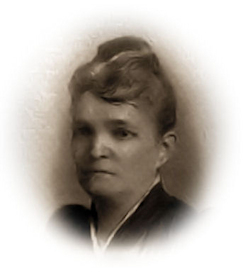
June 13th, 1863.—Shell burst just over the roof this morning. Pieces tore through both floors down into the dining-room. The entire ceiling of that room fell in a mass. We had just left it. Every piece of crockery on the table was smashed. The “Daily Citizen” to-day is a foot and a half long and six inches wide. It has a long letter from a Federal officer, P. P. Hill, who was on the gun-boat Cincinnati, that was sunk May 27th. Says it was found in his floating trunk. The editorial says, “The utmost confidence is felt that we can maintain our position until succor comes from outside. The undaunted Johnston is at hand.”
Note: To protect Mrs. Miller’s job as a teacher in post-civil war New Orleans, her diary was published anonymously, edited by G. W. Cable, names were changed and initials were generally used instead of full names—and even the initials differed from the real person’s initials. (Read Dora Richards Miller’s biographical sketch.)
0
June 12, 2023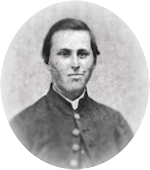
June 12th. All is ready for our scouting trip, rations, with a good supply of ammunition, and equipment all in good condition. Tonight finds us still in camp, ready to start.
War Diary of Luman Harris Tenney.
June 12, 2023
12th. Henry Drake quite bad with abscess on his knee. Rob and I sat up with him. Wrote a line home and to Fannie.
Downing’s Civil War Diary.–Alexander G. Downing.
June 12, 2023
Friday, 12th–Our brigade receiving orders, moved out about a mile and again went into camp in a large hollow; we fixed up bunks and made a nice camp. I was out last night again with a large detail from our brigade digging rifle pits, working all night with rifle in one hand and pick in the other, digging trenches to protect ourselves in the daytime. There was skirmishing and heavy cannonading all day, and after night by their lighted fuses we sometimes could see the shells from our mortar boats coming over the city and down to the ground before they exploded.
0
June 12, 2023
June 12th. At one thirty A. M., steamer Laurel Hill came down from Natchez, with despatches. Occasional artillery firing, also navy and army mortars bombarding the batteries of Port Hudson—rebels reply with a large rifle; at eight A. M., heavy musketry and artillery firing in rear of Port Hudson. Steamer Bee, despatch boat, came down from Bayou Sara; at eleven twenty P. M., the mortar vessels of lower fleet engaged the rebel batteries, and making some good shots.
A Rebel War Clerk’s Diary
June 12, 2023
JUNE 12th.—A beautiful, bright warm summer day—and yet a little somber.
The surprise of Stuart, on the Rappahannock, has chilled every heart, notwithstanding it does not appear that we lost more than the enemy in the encounter. The question is on every tongue—have our generals relaxed in vigilance? If so, sad is the prospect!
But Vicksburg is the point of intensest interest and anxieties. Gen. Johnston writes from Canton, Mississippi, on the 5th inst., in reply to the Secretary, that he regrets such confidence is reposed in his ability to save Vicksburg, and fears that such expectations will be disappointed. Grant is receiving reinforcements daily—while he (Johnston) is not to have more troops. He does not state the number he has, but he says it seems to him that the relief of Vicksburg is impossible. Pemberton will hold out as long as he can; but if Grant’s line be not broken, the fall of Vicksburg is only a question of time. Grant’s force (he continues) is more than treble his; and Grant has constructed lines of circumvallation, and blocked up all the roads leading to his position. To force his lines would be difficult with an army twice as numerous as the one he (Johnston) commands. He will try to do something in aid of the besieged—but it seems a desperate case. He has not wagons and provisions enough to leave the railroads more than four days. The track to Vicksburg is destroyed. It was his intention at first to unite all the troops in his command—but it was impracticable. So much for these lugubrious tidings. Nothing but a miracle can save Vicksburg!
The Governors of Alabama and Mississippi unite in urging the government to suppress both the foreign and border traffic. I fear it is too late!
There is a street rumor that the enemy have appeared on the Chickahominy, and on the James River. If this be so, it may be to embarrass Lee; or it may be a determined and desperate assault on this city. We shall know very soon. But never before were we in such doubt as to the designs of the enemy; and never before have they evinced such apparent vigor and intrepidity. Yet, they know not what Lee is doing to call them home.
0
June 12, 2023
From the diary of Osborn H. Oldroyd
JUNE 12TH.–We expect to be paid off soon, as the pay-rolls are now being made out. Money cannot do us much good here among the hills, but we can send it home. Many a family is dependent upon the thirteen dollars a month drawn here by the head of it.
When the war is over, how many soldiers will be unable to earn, even their own living, to say nothing of that of their families, all on account of wounds or disability incurred in the service. I have heard many a one say he would rather be shot dead in a fight than lose a limb, and thus be compelled to totter through life disabled. But I know our country will be too magnanimous to neglect its brave defenders who have fought its battles till they have become incapacitated for further service. I know we are not fighting for a country that will let its soldiers beg for a living.
We have now but a year left of the term of our enlistment, and the boys are already talking about what they will do. Some say they will stay till peace comes, no matter how long may be the delay, and I think the majority are of this mind. A few, however, will seek their homes when their time runs out, should this war last so long, and the Lord and rebel bullets spare them. For myself, I shall stay, if I can, till the stars and stripes float in triumph once more over all the land.
Here are a few lines :
TO COMPANY E.
You started at your country’s call
To tread the fields of blood and strife,
Consenting to give up your all
All, even to your very life.
And many storms of leaden rain
And iron hail have been your lot;
While yet among the number slain
The dear ones North have read you not.
Oh, may you safely yet return
To those who wait your coming, too;
May their fond hearts not vainly yearn
To greet you when the war is through.
But, though I wish you back in peace,
‘Tis not a peace that quite disarms
‘Tis not a full and sure release,
You simply take up other arms.
Through Some Eventful Years
June 12, 2023
June 12th, 1863.—Our patient, the newest one, likes his quarters very much. Father and Mother wait on him themselves, they are so afraid something may go wrong. The piano is kept closed and Mattie’s poodle has been banished pro tem.
Susan Bradford is 17 years old when this entry was made.
0
June 12, 2023
June 12, 1863, Corinth Chanticleer (Corinth, Ms)
A corporal of the 20th New York regiment lately gave birth to an infant. It was not until quite recently that the sex of the corporal was discovered. Her husband is a sergeant in the regiment. She enlisted as a private, and was promoted for good conduct.
0
June 12, 2023
June 12, 1863, Corinth Chanticleer (Corinth, Ms)
The new and handsome barracks which the soldiers have built for themselves are a great improvement on tents, and add much to the appearance of the city. Each camp being a town corporate, surrounding the city proper. The excellent system of policing which is enforced in our camps will insure good health among the troops.
0
June 12, 2023
June 12, 1863, American Citizen (Canton, Mississippi)
General Hospital, Canton, Miss.}
May 30, 1863. }
Mr. Editor:
Since the evacuation of Jackson and severe marching of the few succeeding days, it has been my misfortune to be confined in Hospital some ten days in this place, where I found the Post Surgeon, Ward Surgeon and Master, and other attendants, very kind and polite, using every effort with their limited means to render comfortable and cheerful the unfortunate sick. ‘Twas during this time, when quite sick, depressed in spirits and almost wearied of life, when my sad heart was cheered by one of those scenes so common among the women of our country.
A carriage halted before the hospital door, when all eyes were eagerly fixed upon the inmates, who called out to one of the clerks, handing a dish of jelly and other little delicacies for the more sick, while they called in person to the convalescing to come forward and receive some refreshments which they dispensed with lavish hands to some thirty or more joyful hearts. ‘Twas both pleasing and amusing to see the grateful beneficiaries as they still clung around the carriage, as if reluctant to leave it, seeking rest on the wheels and elsewhere, while enjoying their unusual delicacy. After the ladies had retired–not amidst shouts and applause heard and known of men, but with the silent prayer of many known and heard only in Heaven, I sent and procured the names of these kind benefactors.
They were Mrs. Ada Latimer and Mrs. George Handy, one of whose face I saw, which was a true index to her character. I am told the refreshments were sent by a “pick nick party” from the country, but all of the contributors, though unknown, will be rewarded above. While noticing such acts of kindness, I would not overlook the kindness of Mrs. Cameron, of this town, to a gentleman whose acquaintance she formed on the first day of his arrival in town, and to whom she sent daily a plate of such food as to please the most fastidious taste. The writer is an entire stranger in Canton, but a close and grateful
Observer.
June 12, 1863
0
June 12, 2023
June 12, 1863, Corinth Chanticleer (Corinth, Ms)
Our officers are becoming alive to the importance of distinguishing between Union men and rebels, and every man in the district is required to take the oath of allegiance or register themselves as enemies of the United States, and be treated as such. This is a wise regulation, and if adopted long ago, might have saved much trouble and annoyance which has been occasioned by the intercourse between rebel citizens and marauding guerrillas which infest our neighborhood.
0
June 12, 2023
June 12, 1863, The New York Herald
Our latest advices from Vicksburg are to the 8th inst. They come from General Grant himself to official persons in Washington. Up to that date the siege was progressing satisfactorily. On the 4th inst. General Grant and General Banks were in communication, Port Hudson at that time, which is the latest date we have, being closely invested. General Grant expresses no fear either of the army in his front or rear, and regards the capture of Vicksburg as certain. The rebels are said to have made an attack on the 6th inst. at Millikin’s Bend and Young’s Point, and were repulsed.
The despatch which was sent to General Johnston by General Pemberton from Vicksburg, asking for reinforcements, was dated on the 28th of May. That despatch, it will be remembered, was intrusted to Green S. Douglas, and by him taken to General Grant. The letter stated, in effect, that if Johnston could not send thirty thousand men to the relief of the garrison at Vicksburg within ten days the game would be up, and Johnston had better retreat with what forces he had. As our dates from Vicksburg direct are to the 8th inst., the ten days had then nearly expired.
The success of General Kimball’s expedition up the Yazoo is now confirmed. He went up as far as Sataria with a force of 3,000 men, thirty miles below Yazoo City, and arrived there on the 4th inst. He learned that a rebel force under General Wirt Adams, 2,000 strong, was not far off, and he immediately marched to meet him. At ten A.M. on Thursday, the 4th inst., he came up with the pickets of the enemy, when a brisk fight ensued, lasting thirty minutes. The enemy gave way and a total rout ensued. Our loss [continue reading…]